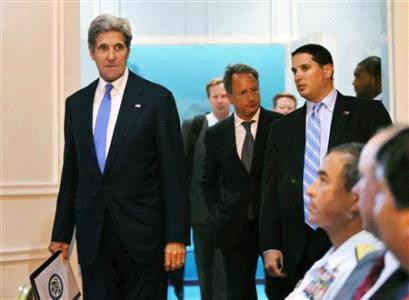Ammon News - WASHINGTON (AFP) - Secretary of State John Kerry is finalizing his team to help shepherd Middle East peace talks and take on the heavy lifting on a day to day basis, a U.S. official said Monday.
State Department spokeswoman Jen Psaki would neither confirm nor deny reports that a former U.S. ambassador to Israel, Martin Indyk, has been chosen to head up the American negotiating team.
In Amman on Friday at the end of his sixth trip to the region Kerry announced that Israeli and Palestinian leaders have agreed in principle to return to talks that have been frozen for three years.
Israeli chief negotiator Tzipi Livni and her Palestinian counterpart Saeb Erakat are due to travel to Washington in the coming days to start the talks.
“This is the first time in years the official negotiators for both sides have publicly agreed to meet at this level,” Psaki told reporters.
But she could not give a precise date for the resumption of talks, saying U.S. officials had been “in touch with both parties over the course of the last couple of days, but I don’t have an on the logistics of the date yet.”
“Right now we are pursuing the way forward. There has been a great deal of work, compromise and sacrifice leading to this point,” Psaki said.
But she stressed she was going to respect Kerry’s commitment to keep the details of the negotiations secret in order to give them the best chance of succeeding.
The top U.S. diplomat was now “focused on putting together the right combination of players to work with the parties,” she said, adding no decision on a negotiator or envoy had been made.
Psaki said the talks are “going to be a challenging process. (Kerry) can’t carry it all on his own shoulders day in and day out. And that’s why he’s looking to put together a senior team.”
The State Department spokeswoman also stressed that the Israelis and Palestinians “have made clear they want to have substantive discussions as early as possible.”
It is likely, however, that the agenda and process will be discussed first before the two sides try to get down to the thorny details on which they remain deeply divided.
Former U.S. president Jimmy Carter, who helped negotiate the 1979 peace deal between Israel and Egypt in what became known as the Camp David accords, said he was “more hopeful than I was a month ago, or five years ago,” about progress.
“It seems to us that this is a certainly propitious time, because it’s been almost a five year absence of any real effort to bring the two parties together,” he said, addressing a conference at the Carnegie Endowment for International Peace.
“No-one knows what’s going to happen, they might meet the first time and adjourn. But I think there’s been a pressure from the Palestinian people and from the Israeli people to have a resolution on this issue.”
White House spokesman Jay Carney meanwhile said the U.S. administration felt “very cautious optimism” about the upcoming talks, stressing that the only way “to resolve these issues is if the two parties sit down in direct face-to-face negotiations.”
Indyk, currently the head of foreign policy at the Brookings Institution, is a veteran of Middle East diplomacy and was named by several U.S. media outlets as Kerry’s choice to head the American team.
Indyk was assistant secretary of state for Near Eastern affairs under then president Bill Clinton and served as ambassador to Israel from 1995 to 1997.
He then again served as ambassador to Israel from 2000 to 2001. Indyk was born in London, but emigrated to Australia as a child. He became a U.S. citizen in 1993.
“Obviously he’s a very well-respected professional with a great deal of experience and background,” Psaki said when asked about Indyk’s qualifications.
“But I don’t have any other updates on the personnel process,” she added.
